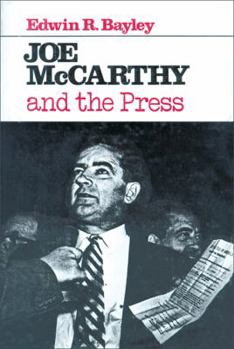Joe McCarthy and the Press
Select Format
Select Condition 
Book Overview
This is a book for historians, journalists--and for all of us who need to remember this turbulent time on our nation's past, and its lessons for today.
Format:Hardcover
Language:English
ISBN:0299086208
ISBN13:9780299086206
Release Date:August 1981
Publisher:University of Wisconsin Press
Length:282 Pages
Weight:1.25 lbs.
Dimensions:1.1" x 6.3" x 9.3"
Customer Reviews
1 rating
It Can Happen Here
Published by Thriftbooks.com User , 16 years ago
This is a dispassionate and important analysis of a man and a time that still produces strong emotional reactions on both sides of the political spectrum. The author was a political reporter for the Milwaukee Journal from 1946-1959 and had a first hand view of the rise of Joe Mccarthy. Bayley attempts to examine the role of the press in McCarthy's ascent from obscure senator to one of the most well known people in the Free World. He considers the period from his speech in West Virginia in 1950 through the Army-McCarthy hearings in 1954. Bayley examines 129 newspapers during this period from all parts of the country and interviews more than 40 reporters and McCarthy associates. He concludes that the mechanics of wire service and daily newspaper reporting helped gave credibility to the unsubstantiated charges made continuously by McCarthy. He quotes Roy Cohn saying that the senator's primary goal was to influence public opinion through the press. The author shows how the Senator and his staff worked the media consistantly and effectively. The wire services competed to provide copy to newspapers. As a result, whatever the Senator said was news simply because it was said by a Senator. With little time for analysis, the papers would carry the next set of charges even if they contradicted the last information from McCarthy. Former United Press reporter John Steele told Bayley, "There was little opportunity in those days to break out of the role of being a recording device for Joe...I felt trapped...The feeling of powerlessness was terrible." Local editors then carried the wire stories because they "refused to believe that McCarthy would make such charges without having the evidence to back them up." As a result, at its peak in 1954, "it was not unusual for a paper to carry 15 to 20 stories a day in which McCarthy was a central figure." The limitations and the reach of the media is very different today. Spin techniques are both more sophisticated and more obvious. But the need to understand the media's limitations as a purveyor of public information is just as important now as it was at the height of McCarthyism. This little known volume from a University Press deserves wider readership given the importance of this evolving relationship






